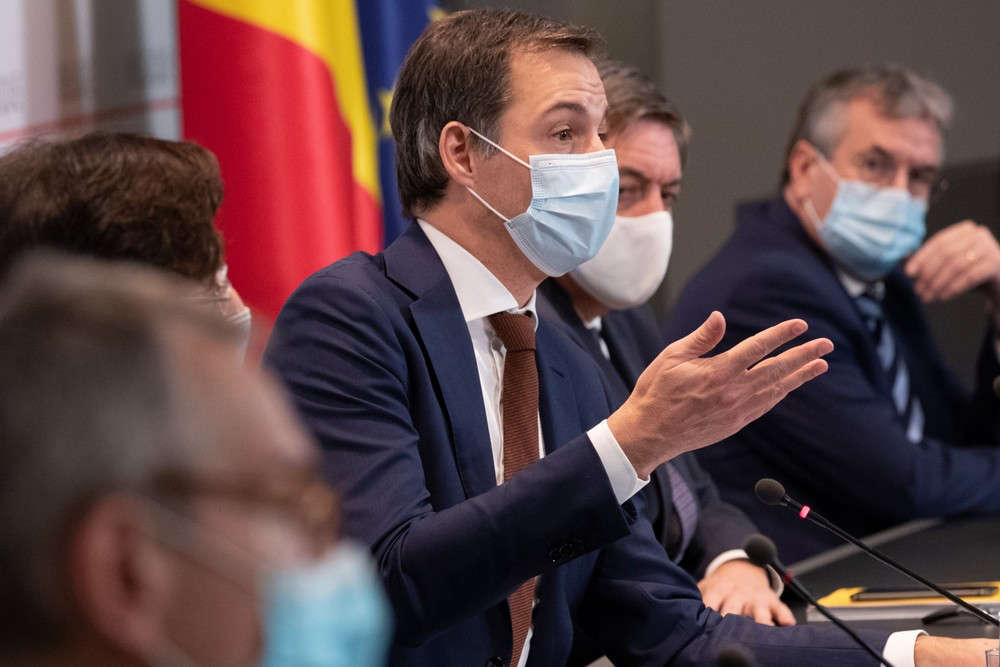Belgium is once again implementing several strict measures to combat the rapid rise in coronavirus infections, announced Prime Minister Alexander De Croo during a press conference on Wednesday.
"I want to start by making two observations," said De Croo. "The first one: the alarm signals are in the red. We see that we have a huge number of infections in our country and the number of occupied beds has doubled in a fortnight."
"We had all hoped to have a corona-free winter, but our country is not an island. If we look at the European map, we see the same trend across Europe, with a number of countries turning red again," he added.
"The second observation is that we have the vaccinations, luckily," De Croo said. "Nine out of ten people have been vaccinated. That is why we are not in lockdown now. That is thanks to all of you."
"The virus variant we are seeing today is three times more infectious than the one that initially emerged. All alarm signals are red," he stressed. "That is why we are taking broad measures. Measures everyone can follow, so we can avoid another lockdown."
The Consultative Committee has opted for an approach of maximum caution, said De Croo. "But above all, this is an approach where we all make an effort together. We put the emphasis on prevention and protection, not closure."
First of all, limiting social contacts, wearing a face mask and keeping the social distance of 1.5 metres remain of the utmost importance, De Croo stressed. If possible, meeting friends should also be done outside.
"We are also going towards a very broad face mask obligation," he said. "This includes indoor areas, but also at events if they take place outside."
This will be made mandatory for everyone from the age of 10 (instead of 12). Whether or not that obligation will also apply to the education sector is up to the Regions to decide, as Education is a regional competence.
Covid Safe Ticket+
Ventilation is crucial, which is why it was decided to better monitor the air quality in schools and, as a result, CO2 meters must be installed in classrooms where many people gather. The same arrangement applies to the workplace.
Teleworking will be compulsory four days a week until 12 December. After that, the obligation will be scaled down to three days a week. An exception is made for companies where teleworking is not possible.
"We are also introducing the 'Covid Safe Ticket+' rule," De Croo said. This means that the face mask obligation will also be extended to all places where a Covid Safe Ticket (CST) is currently required.
In practice, this means at public events and private events with more than 50 people indoors or more than 100 people outdoors, in the hospitality industry, theatres, concert halls, cultural centres, cinemas and indoor amusement and theme parks.
Nightclubs, discos and dance halls that do not want to apply compulsory face masks must require a self-test at the entrance, on top of a valid CST.
For those who are fully vaccinated, a third shot will be given "as soon as possible," De Croo said. There is no concrete timing yet, but he hopes that it will become clear how and when this will happen in the coming weeks.
Additionally, if there is a favourable opinion from the Superior Health Council and approval from the European Medicines Agency (EMA), vaccination of 5-11-year-olds will start as soon as possible. This will be done voluntarily.
'An explosion of infections'
"These decisions are not easy. For many people they are undoubtedly disappointing," said Federal Health Minister Frank Vandenbroucke. "But this is an absolute minimum."
"Right now, we have an explosion of infections. I will give one figure that will also be on the Sciensano dashboard tomorrow: on 8 November, there were 15,224 infections in our country. The provisional figure for Monday, 15 November is 19,306," he added.
"This is truly an explosion of infections. We must intervene everywhere and strongly," Vandenbroucke said, stressing that checks and controls will be stricter from now on as well.
"Action will be taken if there are no CO2 meters, if the CST is not used correctly, and so on," he said. "If we do not take the measures seriously, we will not get to the end of this."
"The consequence is that people who have been vaccinated, but who have less resistance - such as those who are in poorer health, those who are older - are the ones who end up in hospital," Vandenbroucke said.
"Even if the vaccines are an extremely good protection, when there is so much virus going around, there are a lot of casualties," he added. "It is very sad to have to say that, despite all our efforts. We have to fight it together, in all sectors, in solidarity."
These measures will enter into force on 20 November 2021 and will apply until 28 January 2022. In early January, the Consultative Committee will meet again to evaluate the situation and the restrictions.

